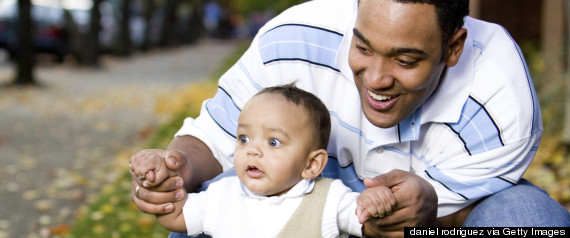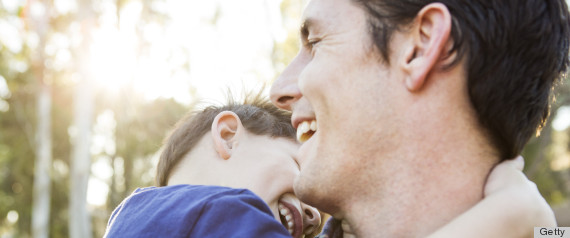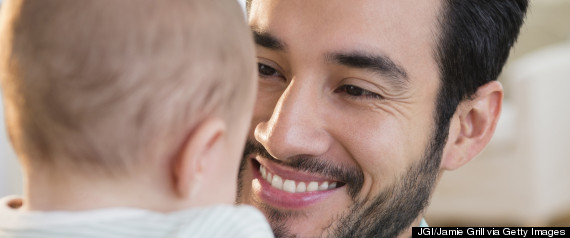
Yes, dads are more involved in their childrens' lives than ever. But that doesn't mean they're not still the butt of almost every parenting joke.
Just think about the 2012 Huggies ad claiming that the brand's diapers were the ultimate "Dad Test" -- a joke that landed flat, as a backlash prompted the diaper company to pull the campaign from Facebook. Then, of course, there was that 2007 Verizon ad, which was banned for depicting another hapless "Everybody Loves Raymond"-type of father. Shows like Lifetime's "Deadbeat Dads" and Fox's "Bad Dads" have also raised more than a few eyebrows. Sensing a theme here?
With an ever-increasing number of dual-earner families and households in which the woman is the main breadwinner, the roles of fathers are shifting, even if public perception hasn't yet, Matthew Weinshenker, assistant professor of sociology at Fordham University, told The Huffington Post. (That's to say nothing of how growing numbers of same-sex couples are redefining what it means to be a "mother" or a "father." Such couples are pushing past traditional gender roles and broadening the range of relationships that children can have with their parents -- and their kids are turning out just fine, research shows.)
Fortunately, a growing body of scientific research is there to back up these poor, patronized dads. Here are eight things science has taught us about the father-child relationship that might convince you to move beyond the "bumbling dad" stereotype.
Playtime is important, and dads have it covered.
Studies have consistently found that the most common way for fathers to interact with their children is in the context of play. Mothers, on the other hand, tend to take on more of the planning and organization that go into caregiving.
The way dads interact with children encourages them to take risks.
Play has been shown to help teach children how to control their bodies as well as their emotions, encouraging them to take risks and be more ambitious in the long term. Even the way fathers hold their children makes a difference. Melanie Horn Mallers, an associate professor at California State University, Fullerton, told The Huffington Post that dads tend to hold their kids out to the world, while mothers tend to hold their children in, facing them. This subtle difference is actually a way in which fathers encourage their kids to take risks, Mallers said, which can benefit them later on in life in terms of their ability to engage with their environment, feel confident, solve problems and cope with stress.
According to Mallers, mothers are more likely to give their children a sense that they are safe and protected from the world. While dads may also convey this sense, they are far more likely to communicate that, as Mallers puts it, "Yes, the world is safe, so now go and explore it."

Playtime with dads can actually help kids form strong relationships later in life.
The bond between father and child can influence the child's ability to form close relationships with other people later in life. A study published in 2002 found that "adolescents' attachment representations were predicted by fathers' play sensitivity," meaning a father's ability to know when to challenge a child and when to back off during playtime. Essentially, this rough-and-tumble play is quality time between a father and child, and it shouldn't be undervalued.
A father's rejection could hurt a child even more than a mother's rejection.
Ronald Rohner has been studying father-child relationships since the 1960s. "Like most Americans, I started out 50 years ago thinking, 'OK, sure, fathers are there and they're important in some ways, but the really important one is Mom,'" Rohner, executive director of the Ronald and Nancy Rohner Center for the Study of Interpersonal Acceptance and Rejection, told The Huffington Post.
In the course of his research, Rohner made the startling discovery that a father's love often contributes to a child's personality development more than that of a mother. Specifically, a father's rejection can cause a child to develop behavioral problems, and the resulting feelings of insecurity, anxiety and hostility can lead, eventually, to drug or alcohol abuse or addiction. Rejection by a father can also hinder a child's long-term ability to form trusting relationships.
Rohner notes that there are always exceptions, and that in some of the cases he looked at, the influence of both parents was about equal, or a mother's love was the factor more indicative of a child's development. But the overwhelming trend he found was that dads tend to wield the most influence when it comes to rejection.
Bad father-child relationships can make children more stressed in the long run.
Rohner isn't the only one who's found that a father's perceived love (or lack thereof) packs a developmental punch. In a 2012 study of 912 men and women, Mallers found that sons who reported good relationships with their fathers were better at handling stress than sons who didn't perceive their childhood relationship with their father to be strong. Mallers says this also ties back to playtime with fathers, which helps children develop problem-solving skills and keep calm when difficulties arise.

Basically, time spent with fathers matters.
Though different studies have reached different conclusions, the results all point to a key takeaway: Spending time with Dad can improve a child’s ability to connect with others in a positive way. Richard Koestner, a psychologist at McGill University, studied the results of longitudinal research conducted at Yale University in the 1950s and concluded that the less time a father spent with a child, the less the child was able to feel empathy.
"We were amazed to find that how affectionate parents were with their children made no difference in empathy," Koestner told The New York Times in 1990. "And we were astounded at how strong the father's influence was after 25 years."
It's worth noting, however, that Rohner didn't find that to be true in his research. He says it's quality of time, not simply quantity, that counts when it comes to kids perceiving their fathers as loving or not. But however you slice it, children benefit from face-to-face time with dads.
Dads bond with their children thanks to the "love hormone."
A mother's hormone surge and subsequent attachment bonding at the birth of a new baby is a well-known concept. But dads release plenty of hormones, too.
Studies have suggested that new fathers have increased levels of oxytocin, aka the "love hormone," during a newborn's first weeks. Oxytocin allows new dads to bond with their babies, making it more likely that they'll engage in that all-important playtime. In fact, the surge of lovey-dovey hormones in fathers is thought to be sparked by parenting itself -- "tossing the baby in the air, pulling the little one up to sit, or encouraging exploration and laughter," according to a Live Science report of a 2010 study conducted by psychologist Ruth Feldman at Bar-Ilan University.

In fact, new dads experience all sorts of important hormonal fluctuations.
Fathers exhibit about a 30 percent dip in testosterone during their infant's first three weeks, allowing the dads to unleash their inner nurturer and squash any aggressive behavior. Additionally, while waiting for their babies to be born, fathers experience a spike in cortisol, the "stress hormone" that also prompts attachment, and prolactin, the same hormone that causes mothers to produce milk.
Since men aren't producing hormones to help create a baby, Mallers hypothesizes that the stress of a new child causes many new dads to experience these fluctuations.
In short, don't underestimate the importance of fathers.
Amid the social and cultural shifts of the past few decades, many dads have altered the ways in which they relate to their children. As Weinshenker put it: "I don't think we're going back to the 1950s, where a man came home after a long day at work and smoked his pipe and maybe kicked the ball around with his children."
And as women continue to thrive in the workforce, dads will be more and more encouraged to step up to the parenting plate and form strong, nurturing bonds with their kids. They're just waiting for advertisers and reality TV producers to catch up with what researchers have already found.
 Like Us On Facebook |
Like Us On Facebook |
 Follow Us On Twitter |
Follow Us On Twitter |
![]() Contact HuffPost Parents
Contact HuffPost Parents
